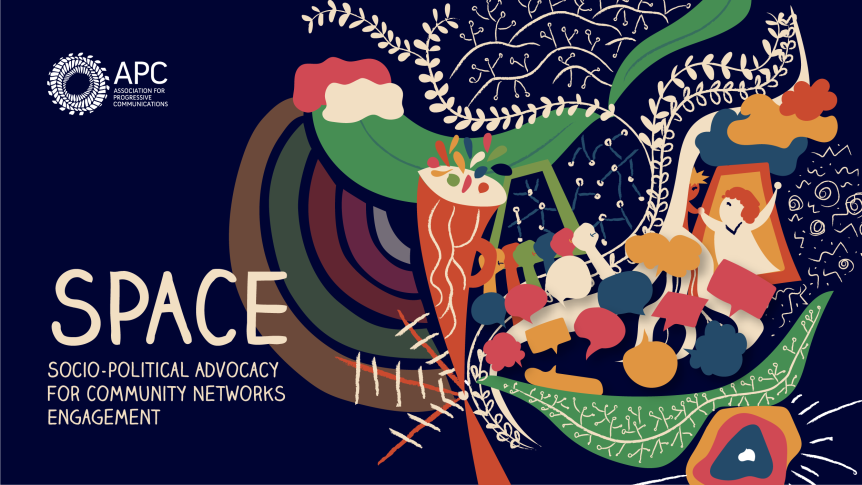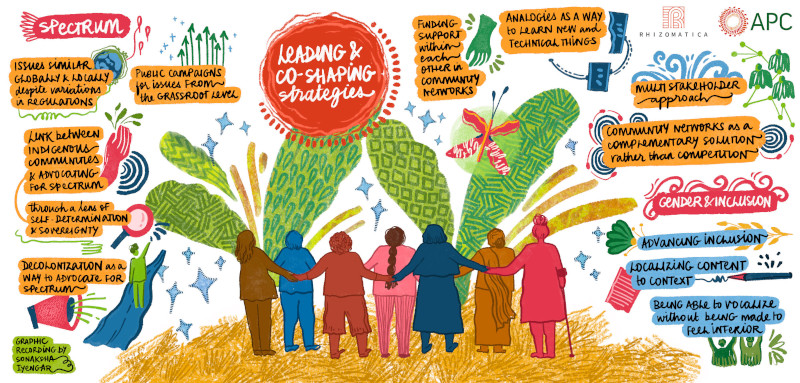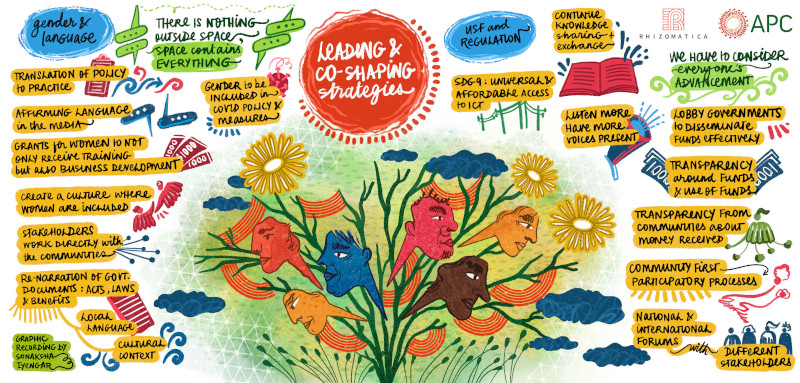
Whose voices are heard in policy and regulatory spaces? What are our gendered experiences in these spaces? How can we build more inclusive, diverse and community-oriented access policies?
Key issues like these were discussed over the past two months by community network advocates, internet governance specialists and digital rights activists from Africa, Asia and Latin America through the Socio-Political Advocacy for Community Networks Engagement (SPACE) initiative. SPACE is a capacity and movement building mentorship programme led by the Local Networks initiative, which is jointly implemented by APC and Rhizomatica. The aim of the mentorship programme is to support women, gender-diverse, queer and trans individuals to take on leadership roles in community networks advocacy.
During this first edition of the programme, held over the course of eight weeks, SPACE participants met twice a week and engaged in sessions facilitated by women and non-binary individuals with diverse backgrounds in digital rights and policy advocacy to discuss, through an intersectional feminist lens, the layers involved in community networks advocacy. The topics addressed included infrastructure, spectrum sharing, women’s roles in community networks, information and communications technology (ICT) laws and governance, telecom regulation, technological innovation, sustainability, and knowledge sharing.
More information on the SPACE agenda and its documentation are available here. The quotes below also capture the experience of some of the mentorship programme participants in their own words:
.gif)
Language and gender inclusiveness
In addition to taking part in the lively discussion during the sessions, SPACE participants were also invited to lead the final sessions of the programme, focusing on designing strategies for the future in two major areas: 1) the politics of gender and language, and 2) universal service funds and regulation.
Along the way, participants shared stories of how both digital technologies and decision-making processes are typically designed by men, with no gender-responsive lens. As an extension of the society in which they are embedded, these processes often reflect the normalisation of centuries of structural exclusion and violence, related to factors such as gender, race, class and nationality. One way in which this normalisation and its harms are perpetuated is precisely through language, one of the key drivers identified by the participants towards more inclusive environments for community networks advocacy and policy change.
Based on their own experiences, participants highlighted concrete and simple examples that are not yet a reality in many multistakeholder forums, such as allowing individuals to designate their own choice of pronouns and discarding the usage of “guys” to address all people in the room. While these examples may seem trivial, when certain terms are repeated every day and in multiple spaces, language can act as a barrier that prevents people from feeling welcome or even poses limits on the many roles they can take on. As one of the participants pointed out, in many countries, media outlets still refer to women as wives or mothers of someone. The awareness that reductionist conceptions such as these are constantly repeated is important for the construction of policy and advocacy spaces that break with them in order to be welcoming to communities in all their diversity.
Action points
Being present, supporting each other and raising awareness were highlighted as ways to build more welcoming and inclusive language and spaces for women, gender diverse people, trans people and people with disabilities. Being present, however, is not a simple task when we recognise all the discrimination and violence which is normalised and repeatedly experienced by certain groups. Another action point identified in this regard is to build a collective commitment to creating more mentally and emotionally safe spaces alongside physical spaces, taking local contexts and barriers into account and seeking to address them whenever needed.
Funding was another point raised as one that needs to be acted upon. While there is currently a fair amount of access to training grants for women, there is limited funding available to women for implementation of projects. Participants stressed the need to move beyond the mentality of just training women to funding initiatives in which women play an active part in different roles.
Concerning funding, SPACE participants also developed an action plan to advocate for more effective, equitable and transparent management and allocation of universal service funds, so that these resources can be mobilised to ensure that people are connected and in this way, able to realise their aspirations and exercise the rights protected by Article 19 of the Universal Declaration of Human Rights, which states: “Everyone has the right to freedom of opinion and expression; this right includes freedom to hold opinions without interference and to seek, receive and impart information and ideas through any media and regardless of frontiers.”
Adopting a community-first approach, promoting knowledge sharing and building evidence through research were some of the steps identified towards this goal. The presentations revealed that to be really participatory, processes should include an active effort to make the spaces welcoming to everyone. Furthermore, participatory processes are key for building effective enabling policies and regulations, which must reflect the multiplicity of people building community networks around the world.


Graphic recording: Sonaksha Iyengar
Next steps
The mentorship programme will continue next year through one-on-one mentoring between the SPACE participants and some of the facilitators. As this first programme of its kind was successfully held online this year, the Local Networks initiative has plans to organise another edition in 2022.
Stay tuned! We will be sharing a series of articles addressing how to build enabling regulation in Africa, Asia and Latin America from the lens of a more inclusive, diverse and community-oriented approach. To learn more about SPACE, community networks advocacy and other developments related to community-based connectivity initiatives, subscribe to our Community Networks and Local Access Monthly Newsletter here.
You can also learn more about gender-inclusive and feminist perspectives on community networks through the GenderIT.org special edition “Infrastructures of Resistance: Community networks hacking the global crisis”.